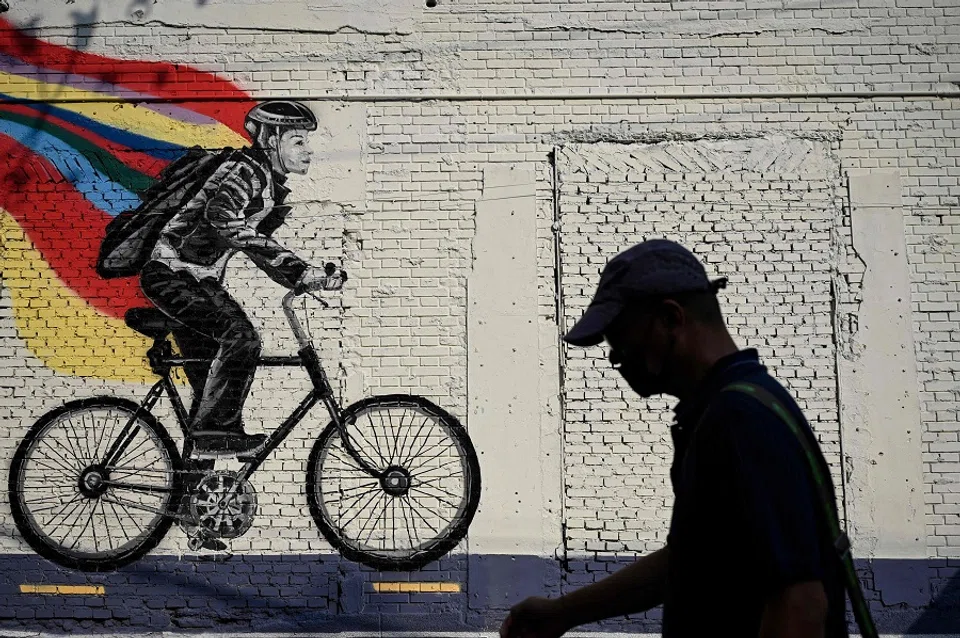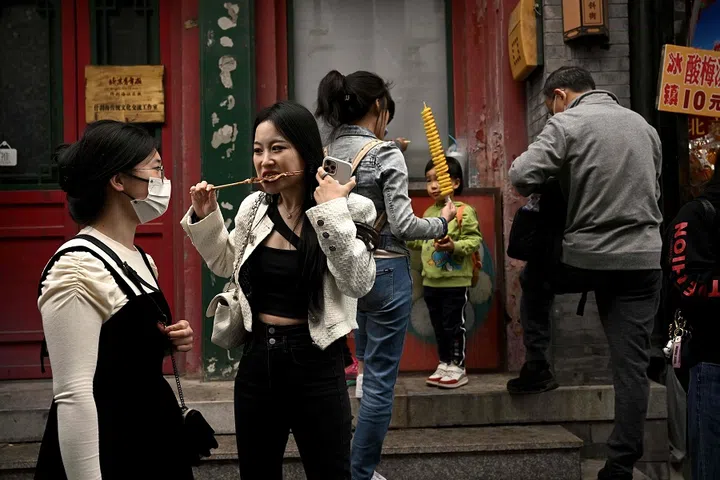Being black in China: Loving something that doesn't always love you back
A young black American who has just finished his master's in Beijing gives a first-hand account of being viewed as the Other in China. Despite some negative encounters, the conversations he has had in the local language and the friendships he has forged have made the experience all worthwhile.

Nothing I write about the experience of being black in China feels sufficient. To condense the entirety of my experience into 1,000, 10,000, or even 100,000 words is a herculean task that I feel ill-equipped for. So, this piece will seek to dive under and explore one wave of an experience that is oceans deep and boundlessly vast. It is intended to be read as a peephole glimpse into a world that is full of nuances and dynamism - it is simply a sliver of my experiences. It will focus on personal experiences with racism, fascination, history and what this all means for me.
Racing
My first stint in mainland China was in 2017. I arrived with high hopes of putting the Mandarin I had learned for the last six years to use. Everything was new - the countless QR codes, the tastes of Jiangnan food, the scorching Nanjing heat, and overt racism.
... it is possible that my decision to begin self-studying Chinese in eighth grade was subconsciously driven by my desire to separate myself from being labelled as "ghetto".
You see, being raised my entire life in a low-income neighbourhood in New York City, and understanding the related negative social connotations, I had spent a significant portion of my life until then running away from anything that would box me into the category of "just another black guy from the hood". My clothing style, diction, pastimes, friends - they were all conscious or unconscious methods of slicing away the parts of myself that would be viewed by American society as "less than" or "uncouth".
It was never that I disliked being black, but I disliked the negative implications of being from a "ghetto". In retrospect, it is possible that my decision to begin self-studying Chinese in eighth grade was subconsciously driven by my desire to separate myself from being labelled as "ghetto". Nonetheless, I spent a lot of my life running away from this label.
When I arrived in China, I realised that the race had ended and that I had lost - the negative side effects of being black were unavoidable. Whether I liked it or not, I was different and was reminded of this fact everywhere I went.

My first experience with overt racism occurred when I was searching for an apartment to rent in Nanjing. After three days in China, I found an apartment that I thought suited me for the upcoming semester at Nanjing University where I would be studying intensive Mandarin.
After verbally committing to the apartment, the landlord informed my school administrators that she did not like black people and that she would not rent to me solely because I was black. I thought I had done everything right: I was respectful, responsible, and pursuing an education but none of that mattered to this landlord who disdained me because of my skin colour.
... to be black in China is itself an act of defiance. In a country that extols pale skin, straight hair, and svelte bodies, I do not in any way fit the norm.
This experience compounded by other smaller incidents - public stares, finger-pointing, clandestine photos, and being cursed at on dating apps made me carry malice in my heart for many months while living in China.
I often likened my experience of being black in China to being at a museum exhibition, only I was the object on display, the object of peoples' gazes - subject to their judgement, approbation, and scorn, because, in fact, to be black in China is itself an act of defiance. In a country that extols pale skin, straight hair, and svelte bodies, I do not in any way fit the norm.
Fascination
Fascination is maybe the best word to describe many Chinese peoples' attitudes toward me in China. People are fascinated by my hair (I can't tell you how many times people have asked me how I wash my hair), my skin (people have examined the palms of my hands and asked why the front side is white and the back so dark), my height, and so many other things.
I also feel a high degree of personal responsibility to be an upstanding actor of blackness in China. The population of China is 1.4 billion, and pre-pandemic black people made up about 500,000 or 0.04% of the population. The number has fallen since pre-pandemic days and a high concentration of the black population in China live in Guangzhou, so most people in China have no or very few experiences with black people. Because of this, my actions may be the only thing they have to predicate their judgements about my entire race on; so, I feel compelled to be as "perfect" as possible to dissolve negative perceptions of black people due to global media and history. But chasing perfection is exhausting and does not truly exist in this world, so I can only do my best.
Irrespective of the negative experiences I have here, those friendships and the feeling of serendipity make China a worthwhile experience for me.

Fascination can also be a good thing. As a person who is not given to striking up conversations with people unless I am absolutely sure the interaction will go smoothly, peoples' fascination with me in China has led to many beautiful and rich friendships because people often engage with me first.
In fact, my friend circle in China may be larger than the one back home in the US. Some of my best friends in the world live in China. Irrespective of the negative experiences I have here, those friendships and the feeling of serendipity make China a worthwhile experience for me.
Loneliness
I think there is a loneliness many black people who live in China experience. This year I was unexpectedly thrust into the world of social media content creation after a video of mine went viral on TikTok. This video entails me explaining the history of American chattel slavery to a Beijing taxi driver in Mandarin. Since then, I have expanded my content to street interviews wherein I ask people about their opinions on certain matters and their experiences.
A series I did about being black in China where I interviewed black students showed me that one thing many black people in China struggle with is dating.

A series I did about being black in China where I interviewed black students showed me that one thing many black people in China struggle with is dating. As I mentioned, fascination can be both a good and bad thing, and when it comes to dating, fascination can only do so much because it only lasts so long.
Many of my peers reported experiences where they were fetishised because of their skin or hair or found it difficult to date at all because of rejection. It is natural that in a country as racially homogenous as China, foreigners are usually an afterthought, and black people who constitute a minority within the minority are even less considered.
What is interesting, though, are the expectations some Chinese people have of black people here. As a 6'2/189cm black man, there are perceptions that some people here have of me that I do not fulfil. Sometimes when I inform them that I am not who they assume I am, they are disappointed and not as interested in getting to know me.
Black people played critical roles in southern Chinese society and were even depicted in classical Chinese art. To this day, Guangzhou continues to be the province in China with the highest population of African residents.
History
The last thing I will do is provide some history about blackness in China to better contextualise the aforementioned experiences and observations. Many of the negative perceptions of black people in China stem from history. The first black people arrived in China on the shores of Guangzhou during the Tang Dynasty, mostly brought by Arab slave traders. Black people were primarily brought to China as slaves, or 昆仑奴 (Kunlun slaves) as they were called in Chinese. They later entered higher social stations, joining the royal retinue of Kublai Khan during the Song Dynasty and becoming artisans, merchants, and businessmen. Black people played critical roles in southern Chinese society and were even depicted in classical Chinese art. To this day, Guangzhou continues to be the province in China with the highest population of African residents.

From the earliest days of Black peoples' entrance into China, they were viewed as the Other. The work of acclaimed China scholar Frank Dikötter evinces a stark reality in which black people were castigated for their "foul odour" and "superhuman strength". Interestingly, a study conducted in Guangzhou in 2010 showed that 75% of people surveyed agreed that Black people had a bad body odour, almost 60% agreed that they were violent or super strong, and 70% agreed that they had innate physical prowess. This is correlative data that suggests a historical linkage to the way black people are viewed in China in the modern day, but there is also a dearth of in depth research in this field.
To be a black person in China is to experience the entire gamut of human emotions, an opportunity that is rare - for that I am thankful.
Takeaways
Coming back to China during intense Covid-19 lockdowns has made me realise that my relationship with this country is more complex than I thought. I believe my relationship with China will continue to change as I enter different stages of life, but as I finish writing this piece at a coffee shop in the heart of Shanghai, I feel grateful to be here, optimistic about the future, and no longer look at my experience here through rose-tinted glasses.
To be a black person in China is to experience the entire gamut of human emotions, an opportunity that is rare - for that I am thankful. All of the experiences I have had here have shaped me in some way - the good, the bad, and everything in between.
Related: Officials say no differential treatment of African community but Chinese in Africa fear sinophobia | [Photo story] A history of Western illustrations insulting the Chinese | Chinese academic: Why the US ignores its own human rights issues and accuses others instead | Anti-Asian hate crimes: What makes an American? | Why do Chinese and Indian Americans stay silent during the US anti-racism protests?





![[Photos] Fact versus fiction: The portrayal of WWII anti-Japanese martyrs in Taiwan](https://cassette.sphdigital.com.sg/image/thinkchina/3494f8bd481870f7c65b881fd21a3fd733f573f23232376e39c532a2c7593cbc)